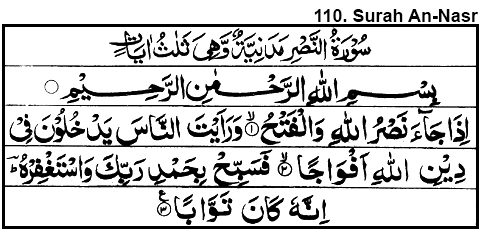Translated as the Victory or Help, also known as surat Fath, Nasr refers to the conquest of Makkah when the city came into the hands of the Muslims. It also goes by another name, surat at Tawdiyah – the farewell surah. It is the 110th chapter of the Quran with 3 verses and was revealed after the migration to Madinah.

In terms of revelation, it was the last full surah to be revealed of the Quran, i.e. from the first verse to the last. It follows on from Surah Kafirun which clearly distinguished the religion of Allah from all other beliefs.
An-Nasr Arabic Text

surah in audio
Surah | |
| Name | An-Nasr |
| Meaning | The Victory |
| Number of Verses | 3 |
| Place of Revelation | Madinah |
| Chapter Number | 110 |
Surah Nasr Transliteration
Bismillaahir Rahmaanir Raheem
1. Iza jaaa’a nasrul-laahi walfath
2. Wa ra-aitan naasa yadkhuloona fee deenil laahi afwajaa
3. Fasabbih bihamdi rabbika wastaghfirh, innahoo kaana tawwaaba
Surah Nasr Translation
1. When the victory of Allah has come and the conquest
2. And you see the people entering into the religion of Allah in multitudes
3. Then exalt [Him] with praise of your Lord and ask forgiveness of Him. Indeed, He is ever Accepting of Repentance.
When was Surah Nasr revealed?
Some scholars believe this surah was revealed before the conquest of Makkah which occurred in 8AH in Ramadan, while others state it was after.
The most popular opinion is that it was revealed after its conquest, during the Prophet’s (SAW) Hajj pilgrimage known as Hajjatul Wida – the farewell pilgrimage that occurred just before his death.
Lessons from this surah
- Increase devotion in worship. The more apparent the blessings you have, the more intense you should be in your worship.
- Thank Allah more. Being given blessings should make you want to thank and worship Allah more.
- Increase your zikr. Carry on making proper tasbeeh and istighfar of Allah to see help and victory. Proper tasbeeh and istighfar means proper implementation of deen.
- Ask forgiveness. You should complete and conclude all good actions with istighfar.
- When making dua for a person, seek forgiveness for them.
Surah Video
Hadith on Surah Nasr
Aisha (RA) reported: The Messenger of Allah said these words often before he passed away, “Glory be to Allah and with his praises. I seek your forgiveness and I repent to you.” I said, “O Messenger of Allah, I see you have said these words often.” The Prophet said, “My Lord has told me that I will see a sign in my nation and when I see it I should say often: Glory be to Allah and with his praises, I seek your forgiveness and I repent to you. I have already seen it in the verses: When the help of Allah comes and the victory, and you see people entering the religion of Allah in crowds, then glorify the praises of your Lord and seek His forgiveness, for he is ever relenting.” (Surah Nasr 110:1-3) (Muslim)
Abu Razin reported: Umar (RA), asked Ibn Abbas (RA) about the verse, “When the help of Allah comes and the victory,” (110:1). Ibn Abbas said, “When this verse was revealed, it was an announcement to the Prophet (SAW) about his passing.” (Musnad Ahmad)



